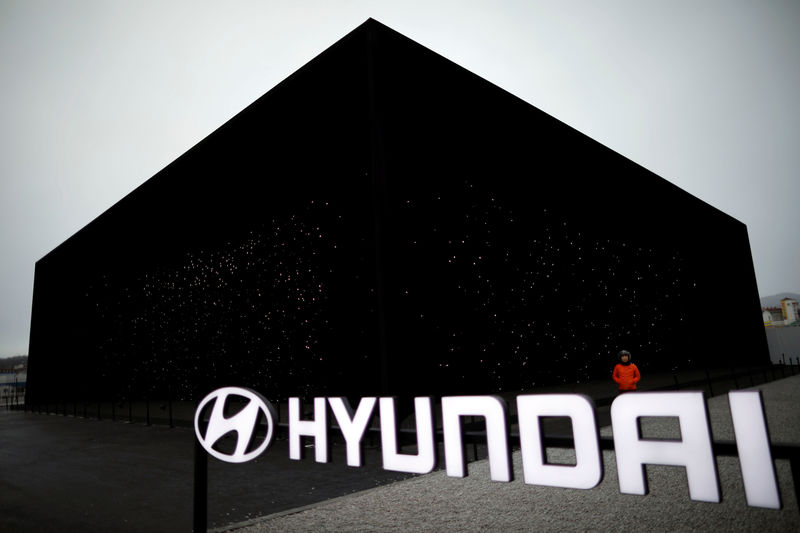By Liana B. Baker
PYEONGCHANG, South Korea (Reuters) - For a major new Olympics sponsor, Japanese carmaker Toyota Motor Corp is oddly invisible at the Pyeongchang winter Games.
Unlike other top global sponsors such as Coca-Cola and Visa, Toyota is nowhere to be seen, having sent only a few dozen representatives to South Korea for the event.
Its cars are missing from Olympic fleets, the logo is nowhere to be seen and only visiting Toyota officials from other countries such as the United States, whose teams it separately sponsors, can wear Olympic rings on their clothing here.
That's because Toyota realized before signing with the International Olympic Committee (IOC) almost three years ago that these Games, like the South Korean car market, would always belong to Toyota's local rivals, Hyundai and Kia.
"Toyota felt that giving up some of our benefits from these partnerships at Pyeongchang 2018 was the right thing to do after conferring with the International Olympic Committee and International Paralympic Committee," a Toyota spokesman said.
Toyota signed its nine-year deal with the IOC in 2015, after Pyeongchang was awarded the Games, the result of a 10-year campaign that had been backed by Hyundai and Kia which were already in separate sponsorship talks with local organizers.
Toyota still has the right as global IOC sponsor to use the Olympics logos in its advertising elsewhere in the world, and it did so prominently this month in two commercials during the U.S. Super Bowl, when a 30-second ad can cost $5 million.
The Japanese firm's marketing during the Pyeongchang Games, which formally opened on Friday, will be seen in 30 countries -- though not in South Korea, a market where foreign carmakers have long struggled, especially those from Japan.
Instead, Hyundai and its affiliate Kia are making the most of their domestic sponsorship rights, having signed their own separate deals with the Pyeongchang Games organizing committee.
They have erected pavilions in Olympic venues to show off their latest-technology vehicles, including Hyundai's hydrogen-fueled autonomous vehicles.
Hyundai, whose distinctive all-black pavilion was designed by British architect Asif Khan, has provided 4,100 cars and shuttle buses for the IOC to use for its VIPs and athletes.
Hyundai declined to comment.
The Pyeongchang organizing committee referred questions to the IOC, which said in an email to Reuters: "In the short term, we worked in partnership with Toyota to enable Pyeongchang to continue their local sponsorship agreement which will provide additional support to the local organizers."
LOOKING TO BEIJING 2022
Toyota's readiness to give up on sponsorship rights in South Korea underlines the tough nature of the market for foreigners, especially for exporters from Japan, a former colonial power that still inspires ill feeling among South Korean consumers.
Imported cars make up about 15 percent of the market, and these are mostly from European makers, South Korean industry data show. Toyota has been in the market since 2001 and its brands accounted for barely a tenth of imports last year.
Insisting on the domestic rights might not only have been futile from a marketing perspective, it could have backfired.
David Krysiek, chief executive of Atlanta-based brand communications firm Brandware, said Toyota avoided "the disastrous prospect of being seen as a carpet-bagger in Korea".
Toyota can at least count on dominating at the next Olympics, the summer Games in Tokyo in 2020, but the one after that could prove tricky: the 2022 winter Olympics in Beijing.
China, parts of which were also colonized by Japan, is another auto market that is tough for Japanese firms, but it is the world's largest and Toyota has no plans to take a step back from the domestic sponsorship rights, as it did in South Korea.
In 2012, Japanese car sales in China nose-dived during a flare-up in a territorial dispute between the two nations. Thousands of Japanese-brand cars were vandalized and mobs attacked dealerships in several cities.
Sentiment has since recovered, and Toyota has set an upbeat sales forecast in China for this year.
"Right now things are more or less back to normal, but we are still handicapped by the past," said the head of a major Japanese carmaker's China operations, speaking on condition of anonymity because of the sensitivity of the issue.
He said "normal" meant that about 10 percent of Chinese consumers would not contemplate buying a Japanese car.
Rob Prazmark, chief executive of 21 Sports & Entertainment Marketing Group, who helped create the IOC top sponsors program, said there was also little risk in China that Toyota would be seen to be gatecrashing a party meant for local carmakers.

"China has its own local auto industry but it's not like what Hyundai and Kia means to Korea," he said.